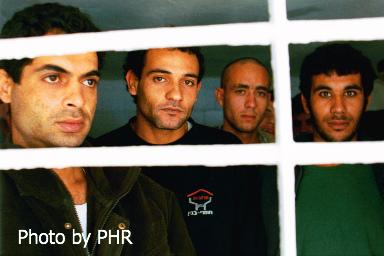Supreme Court Submits to GSS Dictates and Does Not Cancel Order Banning Literary Critic and Journalist Antwan Shalat from Leaving Israel for One Year
On 27 March 2006, the Supreme Court of Israel held a hearing on a petition filed by Adalah on behalf of literary critic, translator and journalist Antwan Shalhat against the Interior Minister's decision banning him from leaving Israel for a period of 12 months, starting from January 2006. The Interior Minster issued the order based on the Emergency Regulations (Leaving the Country) of 1948, on the pretext that any travel by Mr. Shalhat abroad could harm the security of the state.
Mr. Shalhat is a prolific author and expert translator of Hebrew and Arabic literature. He has written, among other things, two dramatic plays and articles on literary criticism, and published many editorials in newspapers. He also worked as an editor for the Al-Ittihad and Fasl Al-Maqalnewspapers. His translations from Hebrew to Arabic include: Amos Kenan, The Road to Ein Harod, 1983; Yeshayahu Leibowitz, People, Land, State, 1986; Q. Zetnick, The Confrontation, 1991; Paul Kor, Caspian (a children's book), 1999; Joshua Sobol, Ghetto (a play), 2000; Hanokh Levin, Queen of the Bathtub (a play), 2000; and Benny Morris, A Correction of a Mistake, Arabs and Jews in Palestine 1936-1956. Mr. Shalhat has also edited the translation to Arabic of Sami Shalom Chetrit, The Mizrahi Struggle in Israel 1948-2000: Between Oppression and Emancipation, Between Identification and Alternative.
Filed by Adalah Attorney Marwan Dalal on 21 January 2006, the petition demanded that the Supreme Court cancel the ban on Mr. Shalhat and place limits on the Interior Minister's authority to impose travel restrictions on citizens. Adalah argued that such authority may only be exercised by the Interior Minister when there is a “near certainty” that the individual's travel will cause harm to state security. Under current Supreme Court case law, the Interior Minister is permitted to use this draconian measure when he believes that there is a “serious and honest concern” that the individual's travel probably will pose a risk to the security of the state.
At the hearing, Attorney Dalal argued that the Interior Minister cannot bar a citizen from leaving the country as long as the citizen does not intend to travel outside of Israel and has not made plans to do so, as is the case of Mr. Shalhat. Adalah contended that the right of a citizen to leave the country is a constitutional right under the Basic Law: Human Dignity and Liberty - 1992. Adalah further argued that the state violated Article 12 of the International Covenant on Civil and Political Rights (ICCPR), which proclaims the right of individuals to leave the country. Israel ratified the ICCPR in 1991.
Adalah emphasized that the nature of the danger allegedly posed by Mr. Shalhat is extremely questionable, particularly since he was not summoned for investigation or interrogation by any authorities before the travel ban was issued. Adalah vehemently challenged the ease with which the Interior Minister and the General Security Services (GSS or Shabak in Hebrew) restricted Mr. Shalat's constitutional rights and freedoms, using arbitrary powers and relying on “secret evidence.” He asserted that such a ban would not be imposed in this manner in the case of a Jewish journalist of Mr. Shalhat's professional standing, such as Hanoch Marmari, Uzi Benziman or Tom Segev.
After Adalah presented its arguments, the Supreme Court held a closed session with representatives of the state and the GSS from which Adalah and Mr. Shalhat were excluded. Shortly after the resumption of the hearing, Supreme Court Chief Justice Aharon Barak recommended that the petition be withdrawn. The petitioners withdrew the petition in order to avoid a Court decision, which approves the GSS's secret materials, a ruling which would cause further harm to Mr. Shalhat.
Acclaimed novelist Sami Michael and “Israel Prize Laureate” Prof. Sason Somekh, an expert in Arabic language and literature, provided affidavits in support of Mr. Shalat, which were included in the petition. In his affidavit Sami Michael states that:
As a reader of Antwan's creation and writing, I was impressed by his ability to find the common by his meticulousness for adopting humanist values... I think that Antwan, through his translation of Hebrew work into Arabic and his public activities, has made a notable contribution to the understanding, closeness, tolerance and friendship between these two peoples: the Israeli and the Palestinian. Therefore, any attempt to restrict Shalhat's work, by any means, will serve, in the end, those who seek hate and enmity and wish to shatter the aspiration of building relationships between the two peoples.
Prof. Sason Somekh stated that:
Antwan's numerous articles and books published during the last decades bear witness to his dedication to the matters he deals with. They place him as an excellent literary critic and a wise and critical commentator on contemporary Hebrew culture… I have no doubt that Antwan is one of the best translators from Hebrew to Arabic of our time. Through his work, he plays an important role in the creation of dialogue between the two cultures.
Commenting on the Supreme Court's position, Mr. Shalhat stated that, “The clear impression is that the GSS dominates all that which is connected to the rights and freedoms of Arab citizens of Israel. Arbitrariness and lack of integrity are bywords for the GSS, as they are for any shadowy regime.”
Attorney Dalal remarked after the hearing that the GSS's unrelenting arbitrariness and illegal control over the Arab minority in Israel, which operate in opposition to the truth and the rule of law, is unacceptable and should be consistently contested and opposed.
H.C. 841/06, Antwan Shalhat et.al. v. The Minister of the Interior (petition withdrawn)
















